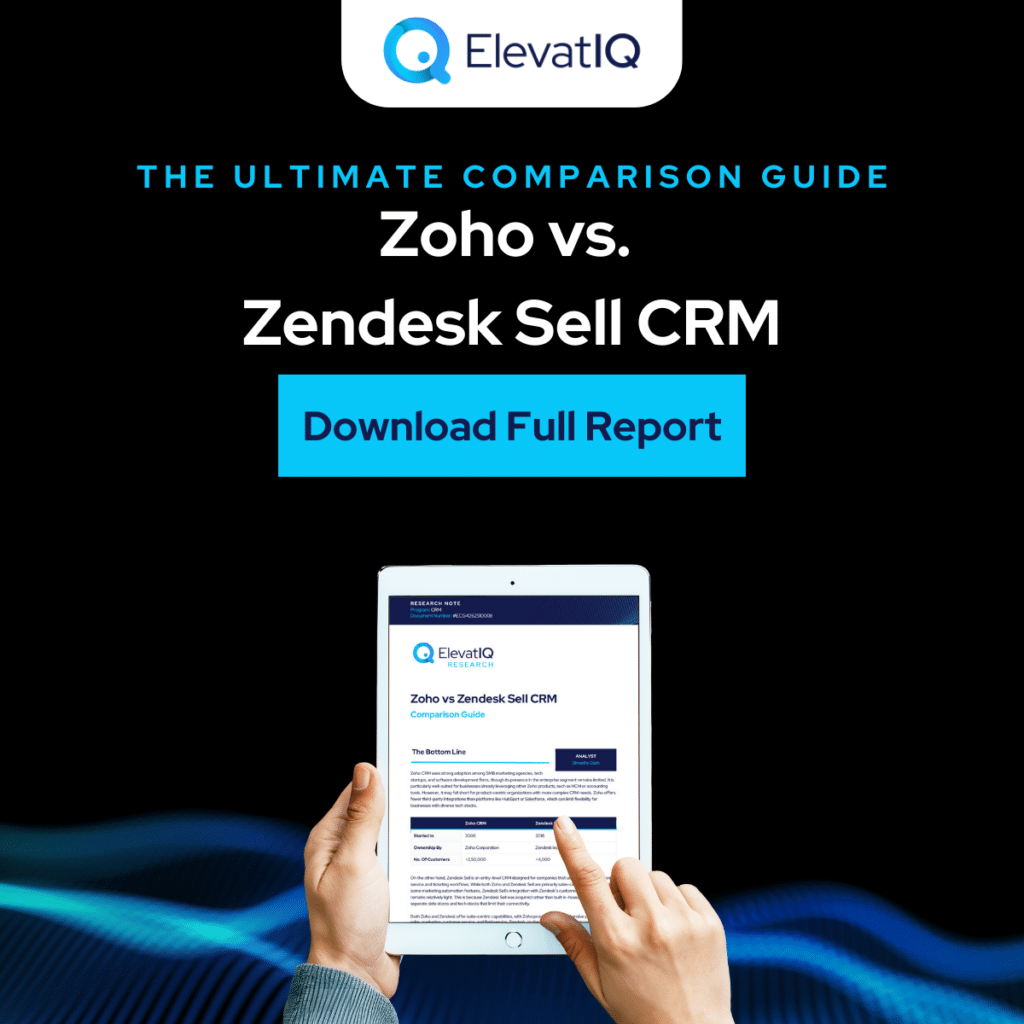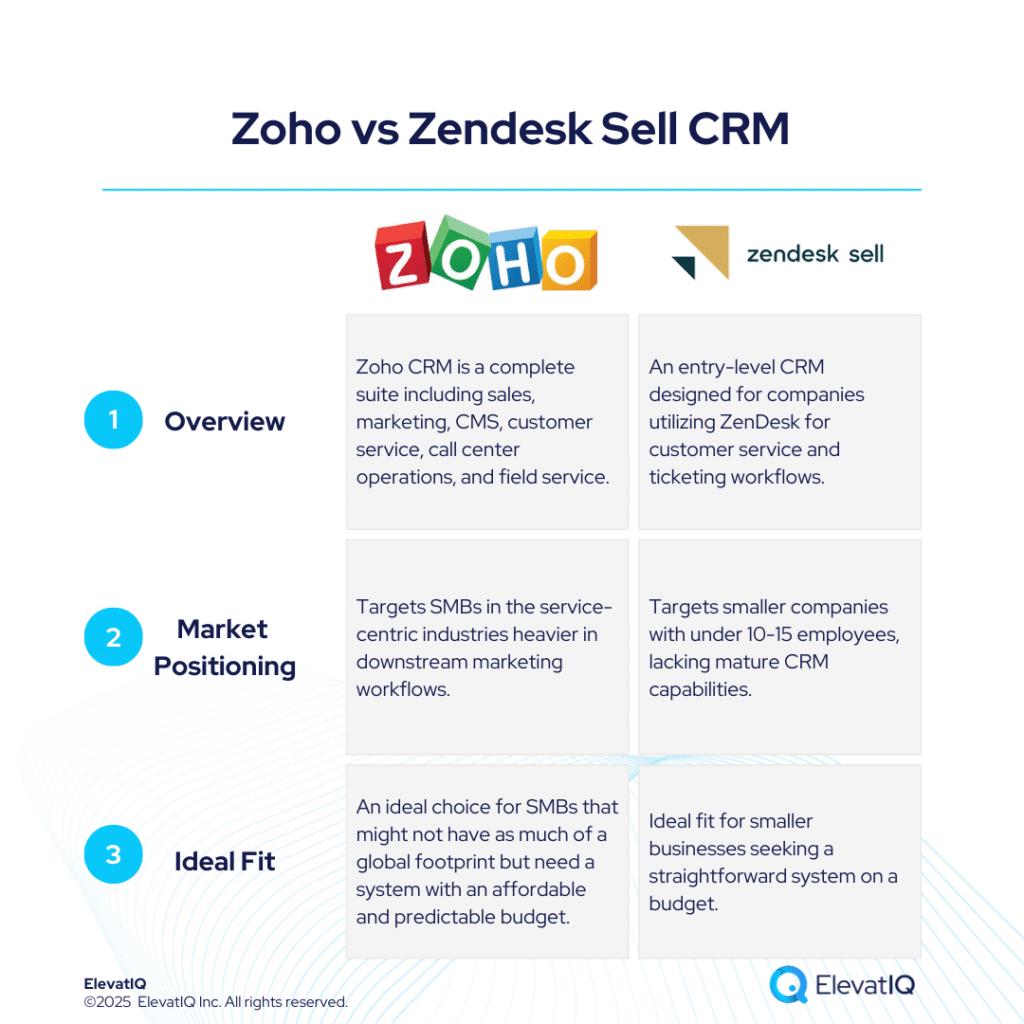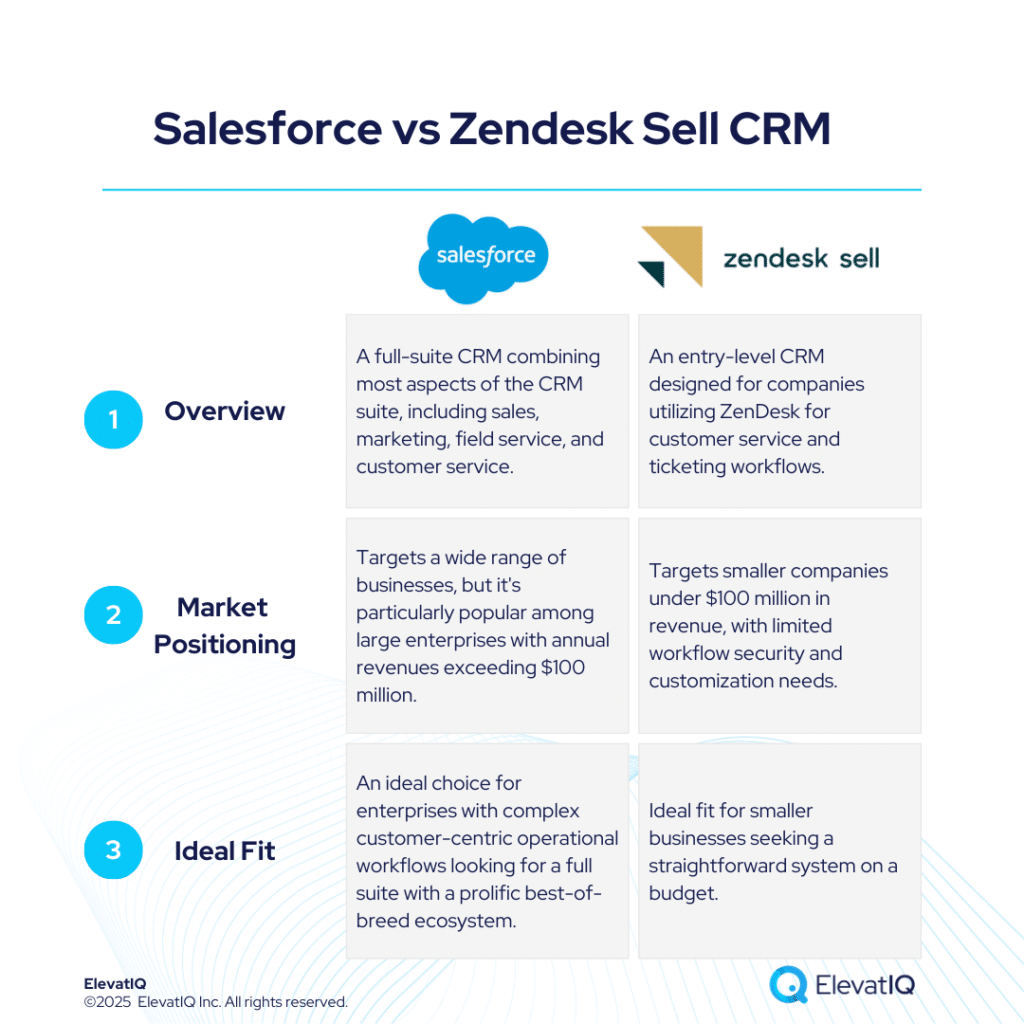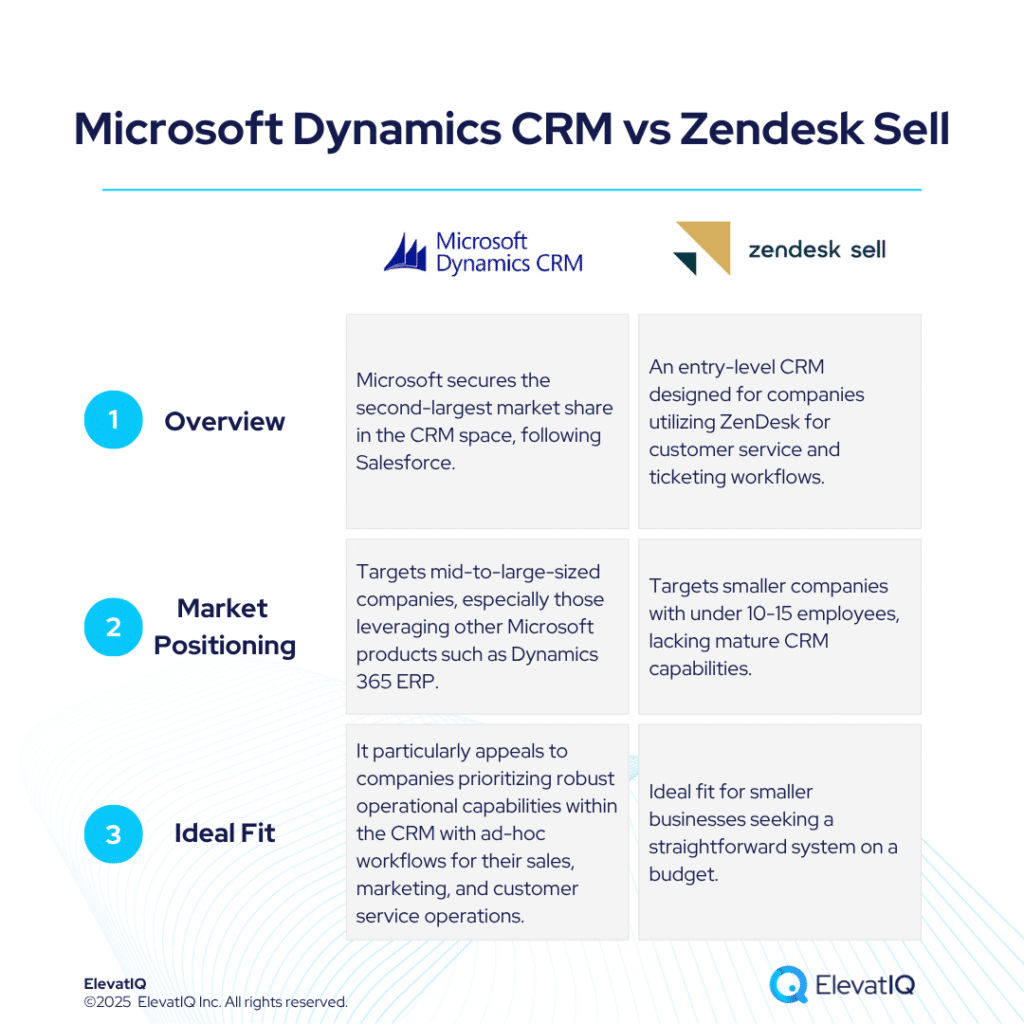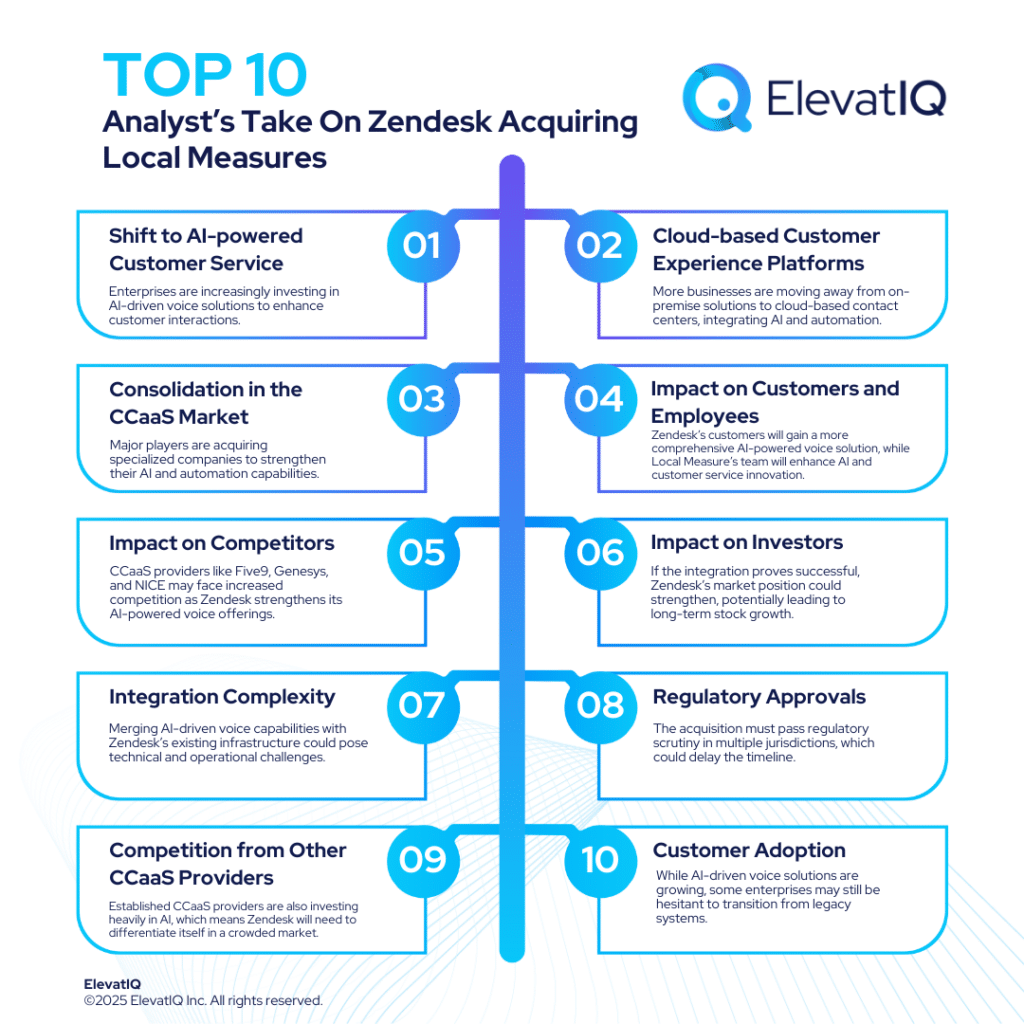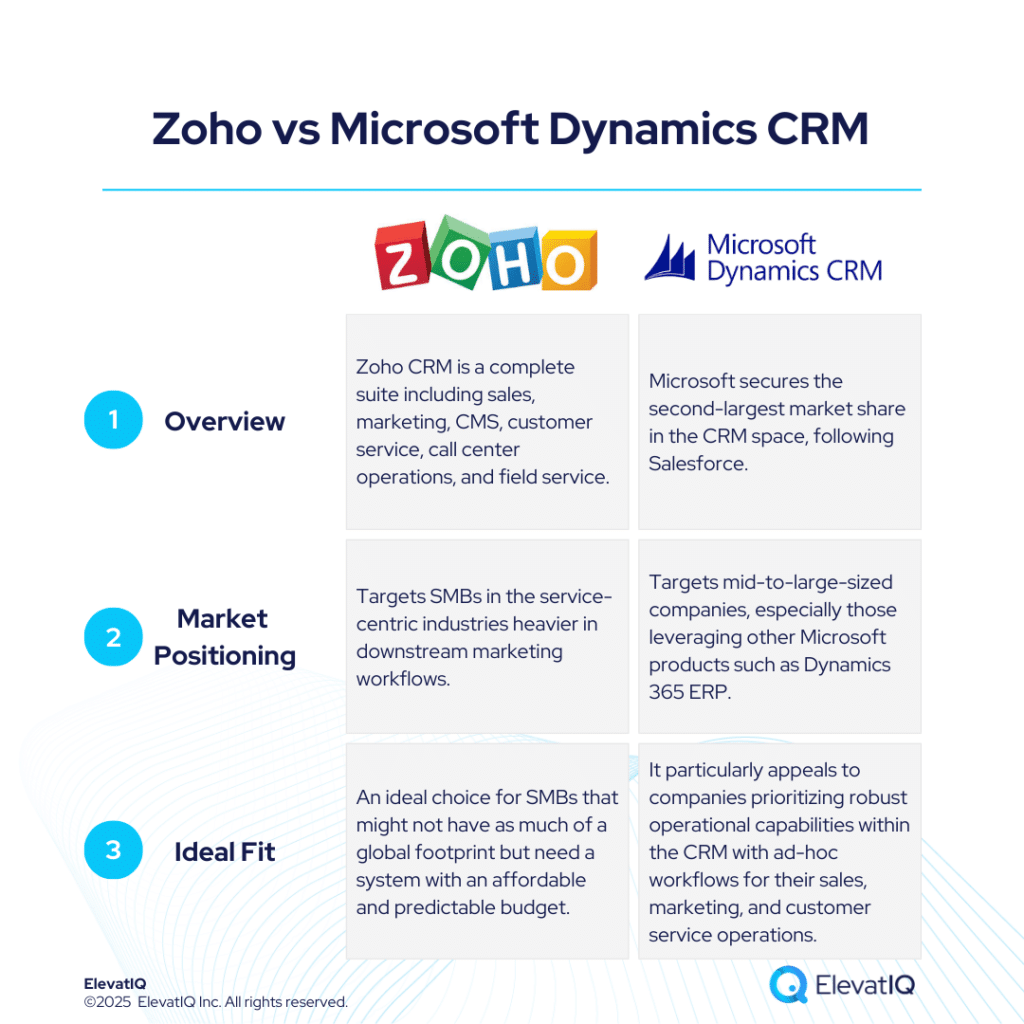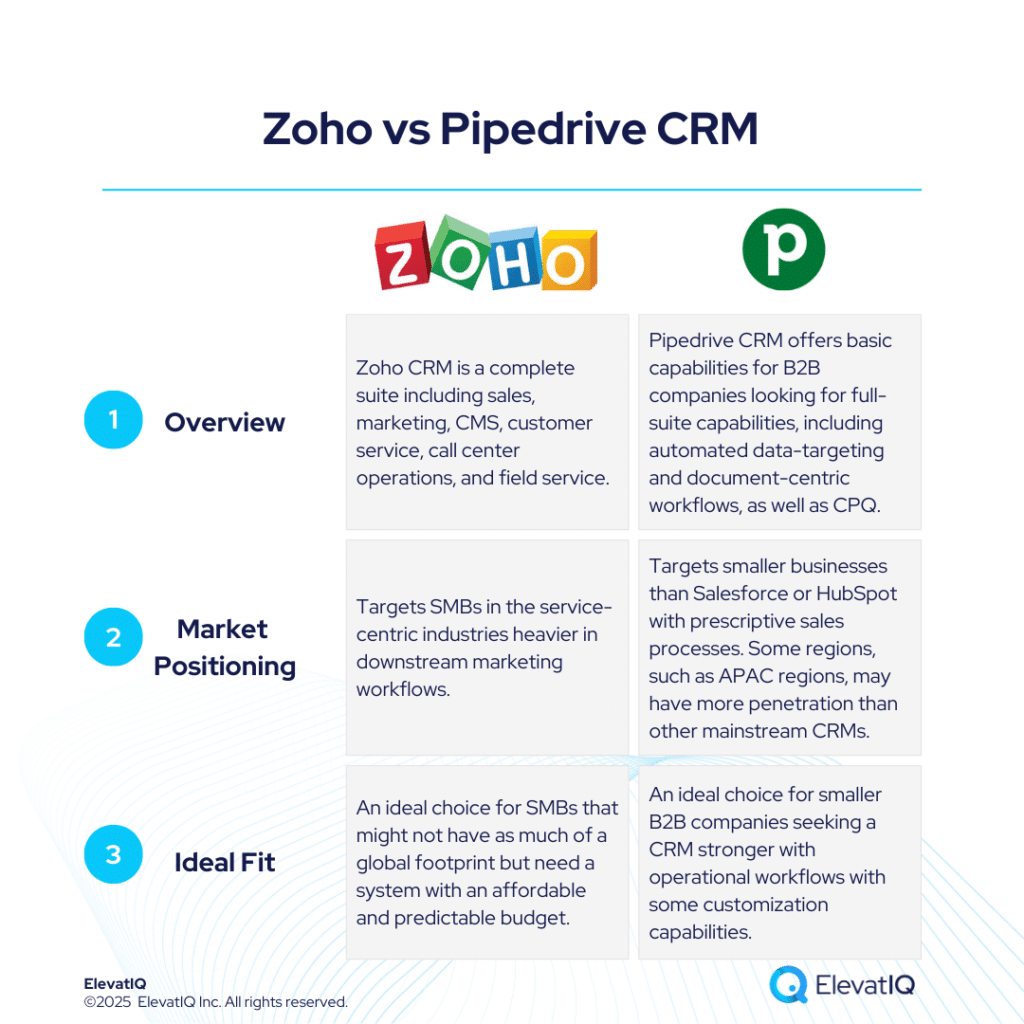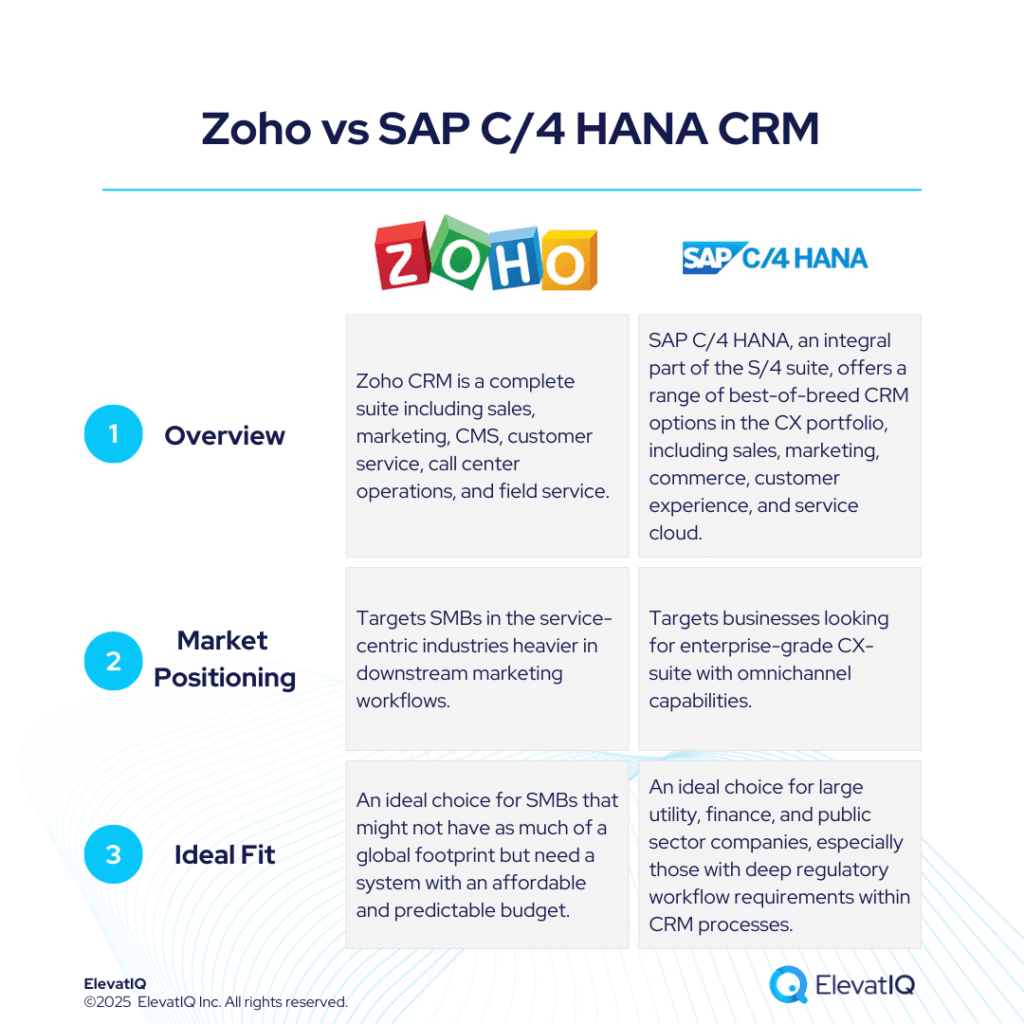Zoho CRM is widely adopted by SMB marketing agencies, tech startups, and software development firms, although its presence in the enterprise space is more limited. It’s particularly advantageous for businesses already using other Zoho products, like HCM or accounting tools. However, Zoho may not meet the needs of product-centric organizations that require more complex CRM capabilities. Additionally, Zoho has fewer third-party integrations compared to platforms like HubSpot or Salesforce, which could limit flexibility for businesses with diverse tech stacks.
In contrast, Zendesk Sell is an entry-level CRM tailored for companies using Zendesk for customer service and ticketing workflows. While both Zoho and Zendesk Sell focus on sales, Zendesk Sell’s integration with Zendesk’s customer service suite is relatively minimal. This is due to Zendesk Sell being acquired rather than built in-house, resulting in separate data stores and tech stacks that limit seamless connectivity.
Zoho and Zendesk both focus on suite-based features. Zoho offers a broader platform that covers sales, marketing, customer service, and field service. Zendesk focuses more on customer service and sales. It includes some marketing automation but depends on third-party add-ons for extra features. Both platforms have strong financial support. Zoho stands out as a leading CRM and HCM provider. Zendesk is more widely used for customer service and often pairs with other CRMs. Some businesses choose Zendesk Sell for its simplicity. It combines CRM and customer service under one vendor, offering a unified experience.
When it comes to integration and ecosystem, Zoho operates within a largely closed ecosystem with limited third-party integrations. On the other hand, Zendesk focuses more on customer engagement, customer success, and telecommunications, with integrations extending to some ITSM providers.

What Is Zoho CRM?
Zoho offers a wide range of CRM products for different market segments. It mainly targets SMBs but has also expanded to serve some enterprise clients. The suite includes tools like Bigin for small businesses and Zoho CRM for larger organizations. These products have improved significantly in recent years. However, Zoho’s CRM tools often struggle with integration. Many apps run on separate data models, which creates communication issues across the platform. This setup limits flexibility for businesses that need seamless data flow or want to integrate external tools. Zoho’s closed ecosystem can also drive up costs. Integration and implementation often require more effort, especially for companies with tight budgets or complex tech environments.
While Zoho provides a comprehensive set of tools for building a complete tech stack, Zendesk Sell offers a more streamlined CRM experience focused primarily on sales and customer service. Unlike Zoho, Zendesk Sell’s integration with Zendesk’s customer service suite remains somewhat separate, limiting connectivity. For businesses focused on customer service workflows, Zendesk Sell might feel more suited to their needs, but for those requiring deeper customization or more complex processes, Zoho’s diverse app portfolio may provide the necessary flexibility. Which solution aligns better with your company’s needs—Zoho’s comprehensive platform or Zendesk Sell’s streamlined approach? Is Zoho’s complex ecosystem a hindrance or a benefit for your team? To explore how these two CRM solutions compare in more detail, download the Ultimate Zoho vs Zendesk Sell CRM Comparison Guide now!
What Is Zendesk Sell CRM?
Zendesk Sell CRM is a budget-friendly, entry-level CRM solution designed primarily for SMBs, offering an easy-to-use interface with basic workflows and integration capabilities. It is a good choice for companies seeking a simple CRM without the complexity of advanced customization or enterprise-level features. However, Zendesk Sell lacks the extensive customization options that larger businesses often require. It is built with a focus on industries that already rely on Zendesk’s customer service products, such as tech, media, and telecommunications. This alignment makes Zendesk Sell a strong fit for businesses that need a straightforward CRM to complement their existing Zendesk suite, especially those operating call centers or customer support teams.
Despite its ease of use, Zendesk Sell falls short when compared to more robust CRM solutions, particularly for organizations looking for deep customization or complex application development. Does your business need a CRM that supports high-level customization or integrations with other advanced enterprise applications? Could Zendesk Sell’s simplicity be an advantage or a limitation for your growing needs? If you’re exploring options between Zendesk Sell and more advanced CRM platforms like Zoho, what level of customization or scalability do you require? For a deeper understanding of how Zendesk Sell compares to other CRM platforms, download the Ultimate Zoho vs Zendesk Sell CRM Comparison Guide now!
Zoho vs Zendesk Sell CRM Comparison
Zoho CRM offers a robust data model similar to Salesforce’s, with strong integration capabilities across its ecosystem, making it suitable for organizations that require extensive customization. While Zoho’s ecosystem is relatively closed, it excels at streamlining operational processes, particularly for SMBs. However, Zoho may not be the best fit for larger companies with complex regulatory or compliance needs, as its customization options and data models may present limitations for businesses with highly specialized requirements.
In contrast, Zendesk Sell CRM uses a simpler and more limited data model. This design makes it easier to implement, especially for SMBs with basic CRM needs. It integrates smoothly with Zendesk’s customer service tools, offering a unified experience. However, its customization and operational features are not as extensive as Zoho’s. It falls short in areas like marketing automation and advanced reporting. Zendesk Sell works well for companies focused on customer service or already using Zendesk products. But if your business needs deeper CRM functionality or strong MarTech integrations, Zendesk Sell may not be enough. So, what matters more to you—customization or ease of use? Do you prioritize robust features or a simple setup? To help you choose, download the Ultimate Zoho vs Zendesk Sell CRM Comparison Guide now!
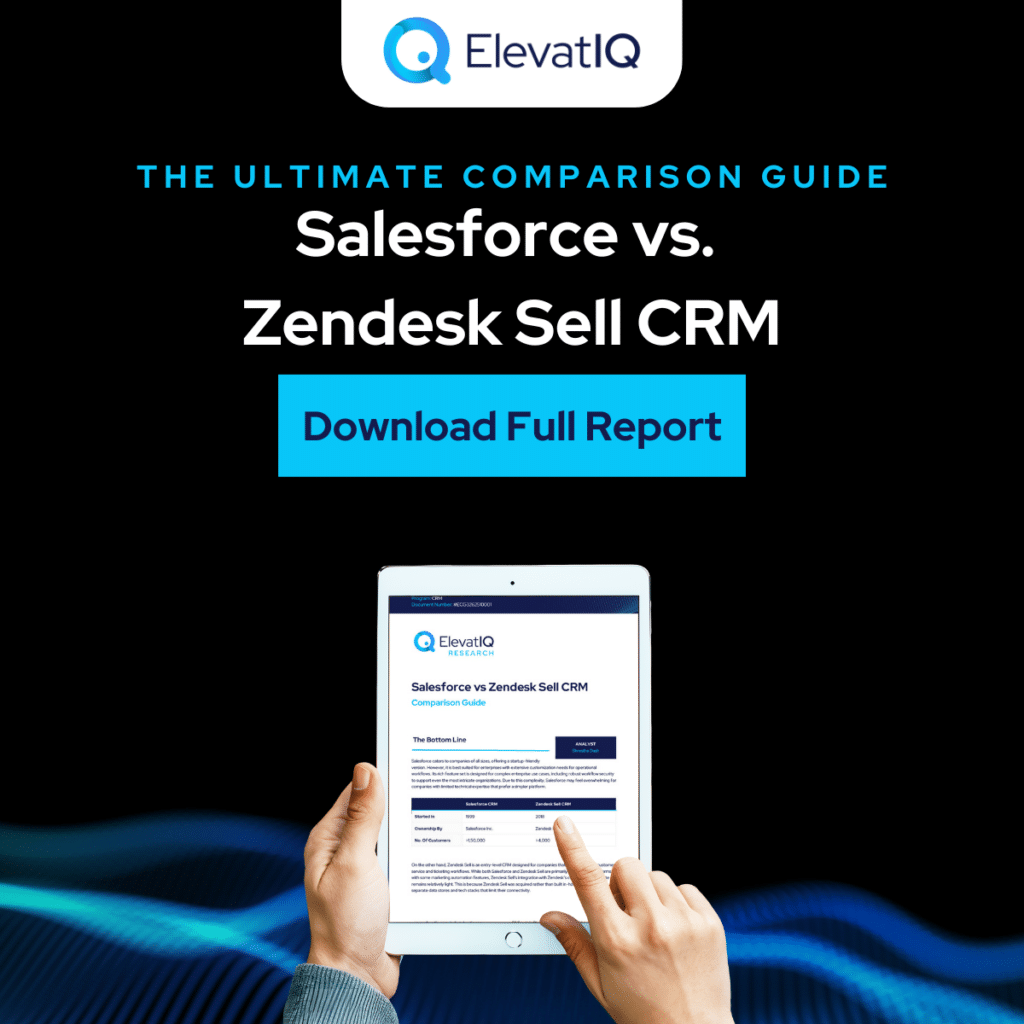
Zoho vs Zendesk Sell CRM Module Comparison
Both platforms provide a wide range of features and functionalities aimed at improving business operations and boosting efficiency. In this comparison, we explore the unique capabilities of Zoho vs Zendesk Sell CRM across key areas, offering insights to help businesses make informed decisions about their CRM choice. This section covers the features of each platform across essential modules, including marketing, sales, customer service, and e-commerce.
Marketing
Zoho CRM supports content creation through tools like Zoho Writer, PageSense, Sites, and Docs. However, it does not offer a dedicated content creation module like HubSpot. On the social media front, Zoho integrates with Zoho Social. This helps businesses manage and monitor their social media presence in one place. It provides a solid solution for social media management. In addition, Zoho includes SEO tools and a strong email marketing system. These features make it a solid choice for businesses looking for an all-in-one marketing platform.
In contrast, Zendesk Sell CRM falls short in these marketing-specific areas. While it offers email integration, bulk email sending, and automated email sequences, it does not provide dedicated tools for content creation, SEO, or social media management. This limitation may prove restrictive for businesses that need more than just a basic email marketing platform. Are you looking for a CRM that seamlessly integrates marketing functions or do you just need basic email capabilities? How important is content creation and social media management in your CRM strategy? To explore all the nuances between Zoho and Zendesk Sell CRM, download the ultimate Zoho vs Zendesk Sell CRM comparison guide now!
Sales
When comparing the sales capabilities of Zoho CRM vs Zendesk Sell CRM, Zoho CRM offers a more comprehensive set of tools for managing and optimizing sales processes. Zoho helps businesses efficiently capture, nurture, and convert leads with its lead management features. It provides a visual sales pipeline, helping teams track deals across various stages while offering insights into email performance through email tracking. With integrated calendar tools, Zoho also allows users to schedule meetings and collaborate in real time with its built-in chat functionality. These features make Zoho CRM an ideal solution for businesses looking for a robust, all-in-one sales management tool.
On the other hand, Zendesk Sell CRM provides core sales functionalities but with fewer specialized tools. While it offers solid lead management, including building targeted prospect lists and setting up follow-up sequences, it lacks a dedicated meeting scheduling tool. Zendesk Sell also provides email integration and performance tracking, along with tools for call logging and syncing customer information across teams. However, it may not be as well-suited for companies that require a high level of collaboration and advanced sales process management. Does your team need an all-in-one solution or are you focused on core CRM functionalities? How important is advanced lead nurturing and meeting management to your sales success? To dive deeper into their differences, download the ultimate Zoho vs Zendesk Sell CRM comparison guide now!
Customer Service
When comparing the customer service capabilities of Zoho vs Zendesk Sell CRM, Zoho CRM offers a more integrated approach to handling customer support. With Zoho CRM, you have access to Zoho Desk and Zoho SalesIQ, providing live chat and efficient ticket management, including SLA tracking. Zoho’s customer support automation allows businesses to streamline workflows, implement escalation rules, and use predefined response templates for a faster, more organized support process. Additionally, Zoho’s omni-channel support allows businesses to manage customer interactions across various communication platforms, ensuring a seamless support experience.
Zendesk Sell CRM, while effective for sales management, relies on its parent platform, Zendesk Support, for customer service functionalities like ticket management, live chat, and omnichannel support. The integration with Zendesk Support offers a robust solution for handling customer inquiries and automating support processes, but it may not provide the same depth of integration for CRM users within the Zendesk Sell ecosystem. Does your business require advanced support features integrated directly into your CRM or is using a separate platform for customer service sufficient? Are omnichannel support and automation essential to improving your customer service experience? To learn more about how Zoho and Zendesk Sell compare in customer service, download the ultimate Zoho vs Zendesk Sell CRM comparison guide now!
E-commerce
When comparing the e-commerce capabilities of Zoho vs Zendesk Sell CRM, Zoho CRM stands out with its strong product catalog management, order fulfillment, and personalized shopping experiences. With Zoho Inventory, businesses can easily manage inventory, warehouse operations, and streamline order processing, providing a comprehensive solution for e-commerce operations. Additionally, Zoho CRM integrates seamlessly with other Zoho applications, allowing businesses to create personalized shopping experiences for their customers. This interconnected system enables businesses to provide a more tailored experience, improving customer satisfaction and driving sales growth.
On the other hand, Zendesk Sell CRM lacks native e-commerce capabilities, such as product catalog management and order fulfillment, which may be a limitation for businesses with significant online retail operations. While it can handle basic CRM functions and integrates well with Zendesk Support for customer service, it doesn’t offer the same level of e-commerce functionality that Zoho provides. Does your business require e-commerce tools like order management and product cataloging integrated into your CRM? Or do you prefer to use specialized e-commerce platforms alongside a more basic CRM? To dive deeper into the strengths and weaknesses of Zoho and Zendesk Sell for e-commerce, download the ultimate Zoho vs Zendesk Sell CRM comparison guide now!
Zoho vs Zendesk Sell CRM Pros
When it comes to evaluating CRM solutions, understanding the unique strengths of Zoho vs Zendesk Sell CRM is crucial for businesses aiming to optimize their operations. Zoho CRM offers powerful capabilities, such as a pre-packaged workflow builder that allows teams with development expertise to create intricate workflows tailored to their needs. Additionally, the inclusion of Zoho Creator enables developers to integrate other software and build custom applications quickly, providing flexibility for businesses with specific requirements. With strong sales compensation and territory planning features, Zoho CRM is well-suited for businesses that require robust, customizable processes.
On the other hand, Zendesk Sell CRM is designed with simplicity in mind, making it an excellent choice for startups or businesses with limited technical expertise. Its user-friendly interface is perfect for sales development reps who are focused on executing multi-touch campaigns. Zendesk Sell excels in providing a straightforward experience for companies that need basic CRM functions without a steep learning curve. Does your team need a highly customizable CRM, or are you looking for something that’s easy to adopt and use right away? To learn more about how Zoho and Zendesk Sell compare across various critical features, download the ultimate Zoho vs Zendesk Sell CRM comparison guide now!
Zoho vs Zendesk Sell CRM Cons
While recognizing the strengths of Zoho vs Zendesk Sell CRM is crucial, it’s equally important to understand their limitations and challenges. Zoho CRM, while powerful in many aspects, lacks robust support for territory management and sales team planning, which can be a significant drawback for businesses that require complex sales strategies. Additionally, Zoho’s integration options outside of its own ecosystem are somewhat limited, which could pose challenges for businesses that rely on a diverse tech stack. Moreover, users have reported occasional glitches in the system, which could hinder the user experience.
Zendesk Sell CRM, on the other hand, faces its own set of limitations. The integration between Zendesk Sell and Zendesk Support is not as tight as some might expect, potentially causing some friction when managing customer service and sales data. Furthermore, the marketing automation capabilities in Zendesk Sell are not as advanced as in other CRM systems, limiting the ability to streamline marketing efforts. Do you need seamless integration and advanced automation, or does your business require a simpler solution? To find out how these CRMs compare in more detail, download the ultimate Zoho vs Zendesk Sell CRM comparison guide now!
Download the Full Research Report
